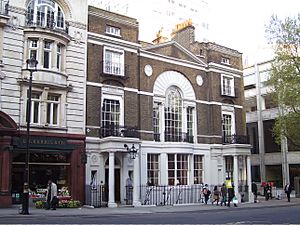Boodle's facts for kids
| Founded | 1762 |
|---|---|
| Founder | William Petty, 2nd Earl of Shelburne |
| Type | Gentlemen's club |
| Location |
|
Boodle's is a very old and famous gentlemen's club located in London, England. Its clubhouse is at 28 St James's Street. The club was started in January 1762 by Lord Shelburne, who later became a Prime Minister of the United Kingdom. Boodle's is known as the second oldest private members' club in London and in the world.
Contents
The Story of Boodle's
How Boodle's Began
Boodle's first started in 1762. It was originally called "Almack's" and was located next to a tavern run by William Almack on Pall Mall. The club was created to be different from another famous club called White's. In fact, one of its first rules said that members of Almack's could not also be members of White's! This showed how unique Almack's wanted to be.
The club's rules were written down by Almack. On January 1, 1762, it was noted that William Almack had taken a new house just for this club. At first, anyone could join by signing their name. After February 10, 1762, new members had to be voted in. If even one person voted against someone, they couldn't join. The club decided to have a maximum of 250 members.
A New Name and Location
Around March 1764, the club changed. It seems to have split into two groups. One group moved to Almack's tavern, which became a clubhouse and later known as Brooks's. The other group stayed at the original house, which became Boodle's.
Edward Boodle worked with William Almack for a few years. He then took over the management of the club in 1764. The rules of Boodle's were very similar to the original Almack's rules. This shows that Boodle's was either a continuation of the first club or a new version with a new manager.
Edward Boodle became the main person in charge around 1768. Famous writer Edward Gibbon joined the club in 1768 and even became one of its managers in 1770.
Moving to St James's Street
Edward Boodle passed away in 1772. The club decided that Ben Harding would take over the business. Even with a new owner, the club kept the name Boodle's.
In 1782, Boodle's moved to its current home at 28 St James's Street, London. The building was designed by John Crunden in 1775. The ground floor was updated between 1821 and 1834.
What Boodle's is Known For
Boodle's is seen as one of London's most important clubs. Many British aristocrats and well-known politicians have been members. It is the second oldest club in the world, with only White's being older. The club even has its own traditional dish called Boodle's Orange Fool!
Early members of Boodle's were often allies of Lord Shelburne. The club is generally thought to be connected to the Conservative Party. Many members have held important roles in the party, but the club is not officially tied to any political group. During the Regency era, Boodle's was known as the club for the English gentry (landowners).
Some very famous people have been members. Sir Winston Churchill, a former Prime Minister, was an honorary member. It is also said that Beau Brummell, a famous fashion leader, made his last bet at the club before leaving the country. Today, you can only become a member if you are nominated and then voted in.
Famous People Who Were Members
Many notable individuals have been members of Boodle's over the years. Here are a few:
- Thomas Blofeld (1903–1986)
- Sir John Blofeld (born 1932)
- Henry Blofeld (born 1939)
- Colonel Claud Thomas Bourchier, a brave soldier who received the Victoria Cross (1831–1877)
- George "Beau" Bryan Brummell (1778–1840)
- Colonel John Worthy Chaplin, another Victoria Cross recipient (1840–1920)
- Sir Winston Churchill (1874–1965)
- William Cavendish, 5th Duke of Devonshire (1748–1811)
- Commander Wilfred Albert (Biffy) Dunderdale (1899–1990)
- Julian Kitchener-Fellowes, Baron Fellowes of West Stafford (born 1949)
- Ian Lancaster Fleming, the author (1908–1964)
- Charles James Fox, a famous politician (1749–1806)
- Edward Gibbon, the historian (1737–1794)
- Andrew R. Hargreaves (born 1955)
- John Henniker-Major, 8th Baron Henniker (1916–2004)
- David Hume, the philosopher (1711–1776)
- Peter Anthony Inge, Baron Inge, a British Army officer (1935–2022)
- William Petty-FitzMaurice, 1st Marquess of Lansdowne, the club's founder (1737–1805)
- Charles Lyell, 2nd Baron Lyell, who also received the Victoria Cross (1913–1943)
- Sir William Miles, 1st Baronet (1797–1878)
- Sir William Roger Clotworthy Moore, 3rd Baronet (born 1927)
- James David Graham Niven, the actor (1910–1983)
- John Profumo (1915–2006)
- Richard Spring, Baron Risby (born 1946)
- Adam Smith, the economist (1723–1790)
- Michael Angelo Taylor (1757–1834)
- Arthur Wellesley, 1st Duke of Wellington, a famous military leader (1769–1852)
- John Fane, 10th Earl of Westmorland (1759–1841)
- William Wilberforce, who worked to end slavery (1759–1833)
- Frederic Morgan, 5th Baron Tredegar (1873-1954)
See Also
- List of London's gentlemen's clubs
 | Madam C. J. Walker |
 | Janet Emerson Bashen |
 | Annie Turnbo Malone |
 | Maggie L. Walker |


